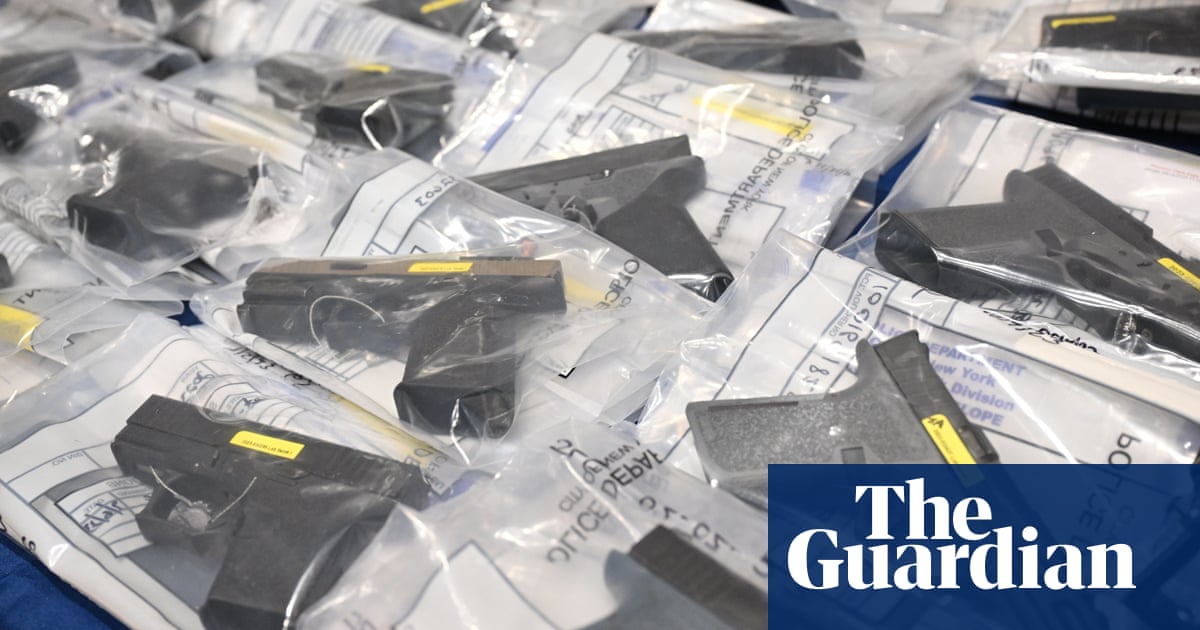The US Supreme Court on Monday barred two Texas-based manufacturers from selling products that can be quickly converted at home into firearms called “ghost guns”, granting a request by Joe Biden’s administration to once again block a federal judge’s order that had sided with companies.
The justices lifted Fort Worth-based judge Reed O’Connor’s 14 September injunction barring enforcement of a 2022 federal regulation – a rule aimed at reining in the privately made firearms – against the two manufacturers, Blackhawk Manufacturing and Defense Distributed.
Brit here. I have a couple of questions:
- If they aren’t firearms, then what are they sold as? Replicas?
- If they aren’t sold as weapons, does that mean someone could import one into my own country?
(I have no intention of doing this, in case this triggers some GCHQ bot and my home ends up like Waco but without all the tiddies)
You gotta understand something about the modern firearms industry that I think gets at your #1. In the past, a “gun” or “firearm” was a complete, assembled package of pieces. It was riveted, screwed, or bolted together, and you’d buy it as a pre-made set. During the Prohibition era where things like moonshiners and Tommy Guns were popular, Congress passed the NFA, which dug into the parts of a firearm that might be significantly more dangerous than others. Those included things like a) selective fire, b) barrel length, c) sound reducers, and d) portability. Suddenly a shotgun was legal, but a shotgun with a barrel sawed off to be shorter than 18" was illegal. A weapon that fired one round per trigger pull was legal, but a weapon that fired multiple rounds per trigger pull was illegal. A barrel with a device that shrouded the explosion was legal, but a barrel that silenced the explosion was illegal. A barrel sold as a non-handgun could not be converted to a handgun, which would make it illegal. The NFA was the first time Congress really tried to grapple with the multi-faceted definitions of “firearm”, and many gun enthusiasts can point out the idiocy of some of the weird attempts to define parts and pieces that fit one category but somehow not another.
Fast forward to the post-Vietnam era, and you find that suddenly you could disassemble and reassemble firearms to make new configurations. That includes changing barrels, lower receivers, grips, foregrips, stocks, etc. Suddenly you could shoot a .410 shotgun shell out of an AR-15 “rifle” simply by expanding the chamber and barrel to accommodate the larger diameter. You can also shoot a shotgun shell out of large caliber handguns. You can also shoot a pistol round out of a “rifle”, and a rifle round out of a “pistol”. The definitions are maddeningly confusing. In its attempts to try to stay ahead of the industry, the federal government had to decide which pieces counted as a “firearm” and which ones were just added furniture. The “lower receiver” is actually a “firearm” by law, even though it needs a barrel and stock to fire effectively and accurately, and it must have a serial number. The upper receiver is not a firearm because it’s just a barrel and a grip, so it can’t fire a projectile. Upper receivers are significant parts of a firearm, but they aren’t technically a firearm in and of themselves. So until ghost guns you could buy parts like Legos, and piece them together to make whatever kind of gun you wanted.
It was only a matter of time before someone realized that you can finish steps 1-9 in making a lower receiver, but if you don’t take step #10 it doesn’t fit the legal definition and therefore doesn’t have the same requirements. With a simple drill press and basic instructions someone can convert a block of shaped aluminum into a fully workable firearm. This is only a few short steps removed from the fact that anyone can use a bit of machinery to mill a lower receiver out of stock aluminum from scratch. Firearms are not terribly complicated to make as long as you have machines that are capable of producing pieces that fit snugly together with low tolerance (wiggle). A “ghost gun” is simply a bit of metal with most of the complex configurations of a receiver finished, but that needs a few final tweaks at home before it’ll fit with other pieces of a firearm. It therefore is sold without a serial number and significantly blurs the boundary between firearm manufacturer and consumer. They’re sold exactly as you’d think, as unfinished lower receivers.
In response to your #2, that depends on how your government defines “weapon” and “firearm”. You’re likely only buying a chunk of metal in the shape of a lower receiver, and if you don’t know how to mill it yourself it’s 100% useless as a firearm. I have no doubt you could import one to your home country, but your law enforcement agency would have difficulty figuring out what law you’re violating by doing so, because a law has to have a very specific definition to be actionable and enforceable.
Wow what a detailed, well-written and fascinating response. Thank you for writing that, I thoroughly enjoyed reading it.
It would almost be worth putting #2 to the test, just to see what would happen. As you mention it would be a legal minefield.
Interestingly (and I guess this is the same in the US?), it’s illegal to open someone else’s mail. For sure Law Enforcement could get around that, but they would need a court warrant and you’d have to pity the judge whose desk that landed on.
The law states:
84 Interfering with the mail: general
A person commits an offence if, without reasonable excuse, he—
intentionally delays or opens a postal packet in the course of its transmission by post, or intentionally opens a mail-bag.
I think that if the package was innocuous (i.e. didn’t have <b>Jeff’s Gun’s By Post </b> emblazoned on it with a drawing of a strutting Texan blowing the smoke from his revolver), then it could be tough to find “reasonable excuse" to open the package.
Joking aside, if the recipient was a known member of forums promoting hatred or violence then it could be considered reasonable to make at least a cursory examination based on “why was this package received from from there?”.
It’s legislation with good solid intent (IMHO), but it’s so vague that it can’t cover everything.
Nor yet anyway.
As we come from different nations, our feelings on the matter may differ and I don’t really want to discuss that. But thank you, you’ve made it easier to understand the context.
but they would need a court warrant and you’d have to pity the judge whose desk that landed on.
I’m not familiar with UK Customs laws, but I highly doubt a Customs officer needs any type of probable cause, let alone a warrant, to look through international mail or cargo.
Hmmm yeah you might be right. As soon as a package is in the hands of Royal Mail then it may not be opened. At Customs, it’s still outside RM’s domain. The Customs guy effectively posts it into the domestic system.
-
There’s a term known as an 80% lower. The lower receiver of an AR style rifle is what’s considered the firearm. By selling an 80% finished product, the seller skirts pretty much all gun regulations as the person isn’t selling a gun, and the buyer has to complete the last 20% of manufacturing which transfers the ownus of the legality onto the buyer/end user. In the USA it is perfectly legal for an individual to manufacturer a gun for their own personal use so long as they are not manufacturing for later sale.
-
Each country has their own importation rules and regulations. Most likely UK customs will have their own definition of what a firearm is, and will likely not allow an import of finished or partially finished gun parts.
The FGC9 is a 3D printed gun, developed by a German, specifically for people who do not have access to firearm parts. The FGC9 relies entirely of off the shelf hardware store parts and has been tested to fire multiple hundreds and in some cases thousands of rounds accurately before failure.
-
-
They can sell parts of a firearm, for instance something like an 80% lower, that may not be regulated the same way as an assembled firearm. They can also sell files if they wished, to print or mill firearm parts.
-
Still depends on UK laws, sorry I’m not familiar with them past (at least I think) the full ban of handguns.
So for UK firearms, you are allowed them for very specific purposes and can’t ever use it outside of those purposes. You have to make your case and get a license before you can buy a gun more powerful than an air rifle/pistol. You can’t carry in public, even concealed.
UK law doesn’t recognise the concept of defensive weapons, so if you use one, even in self defense, and you don’t have any legal context for carrying the gun in the first place, you’re fuuuuucked.
-
I really thought American learned that banning things just makes a black market.
They did, it creates lucrative and profitable enterprises which is why they keep doing it. Oh wait did you mean this as a bad thing? lol
Guess I’ll see you again when they catch a dude printing Glock switches and ar lowers 🙄
Meh they’re not banning firearms just this one method of making them and this market is already somewhat of a black market considering they’re trying to skirt around the laws of the regulated traditional market.
If they prevent these kits from being sold people are just going to get them further outside legal means to get them. Punishing someone harder for the same crime doesn’t fix the issue. It just makes people bitter.
Hell “ghost guns” aren’t even the issue. Allowing charlatans to have whole news stations with no regulations besides being sued is probably the real issue but we’ll sooner solve that issue then the gun violence issue.
That’s how laws work. They make something illegal. You have to break the law to do it. You get punished.
Nobody thinks outlawing something will completely end it. But it will make it duck back into its hole and sometimes that the best we can do.
The supreme court has been corrupted by rich plutocrats.
Somebody is not getting their cut, otherwise the SC wouldn’t block this.
deleted by creator
It has, and yet this specific case they’re siding against the powerful corporate interests.
Likely siding with other corporate interests.
and yet this specific case they’re siding against the powerful corporate interests.
No they’re not. Disarming the populace is the epitome of siding with the rich and powerful.
These are no name companies. Nowhere near big enough to win the government’s favour
They are siding with common sense on this one. We cannot have a society in which anyone can make as many guns as they want in their home with no oversight or accountability. Call it however you want, this stuff is never going to be legal.
We cannot have a society in which anyone can make as many guns as they want in their home with no oversight or accountability
I hate to break it to you, but that’s always been possible. Guns are not very complicated, and are well within the capability of a DIYer with a $500 small lathe.
I think you know that’s not the same thing.






